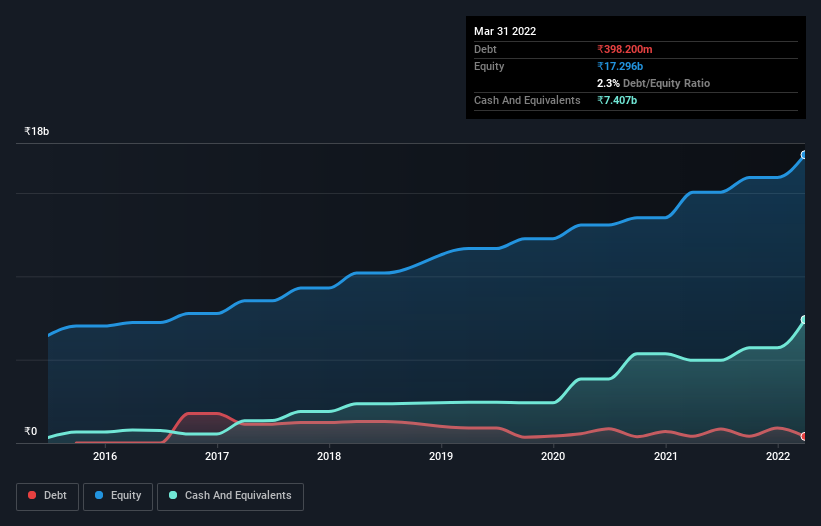[ad_1]
Legendary fund manager Li Lu (who Charlie Munger backed) once said, ‘The biggest investment risk is not the volatility of prices, but whether you will suffer a permanent loss of capital.’ It’s only natural to consider a company’s balance sheet when you examine how risky it is, since debt is often involved when a business collapses. As with many other companies TTK Prestige Limited (NSE:TTKPRESTIG) makes use of debt. But the more important question is: how much risk is that debt creating?
Why Does Debt Bring Risk?
Debt is a tool to help businesses grow, but if a business is incapable of paying off its lenders, then it exists at their mercy. Part and parcel of capitalism is the process of ‘creative destruction’ where failed businesses are mercilessly liquidated by their bankers. However, a more common (but still painful) scenario is that it has to raise new equity capital at a low price, thus permanently diluting shareholders. Of course, plenty of companies use debt to fund growth, without any negative consequences. The first step when considering a company’s debt levels is to consider its cash and debt together.
See our latest analysis for TTK Prestige
What Is TTK Prestige’s Debt?
As you can see below, TTK Prestige had ₹398.2m of debt, at March 2022, which is about the same as the year before. You can click the chart for greater detail. However, its balance sheet shows it holds ₹7.41b in cash, so it actually has ₹7.01b net cash.

How Healthy Is TTK Prestige’s Balance Sheet?
Zooming in on the latest balance sheet data, we can see that TTK Prestige had liabilities of ₹6.02b due within 12 months and liabilities of ₹824.9m due beyond that. Offsetting these obligations, it had cash of ₹7.41b as well as receivables valued at ₹3.37b due within 12 months. So it actually has ₹3.93b more liquid assets than total liabilities.
This short term liquidity is a sign that TTK Prestige could probably pay off its debt with ease, as its balance sheet is far from stretched. Succinctly put, TTK Prestige boasts net cash, so it’s fair to say it does not have a heavy debt load!
On top of that, TTK Prestige grew its EBIT by 33% over the last twelve months, and that growth will make it easier to handle its debt. The balance sheet is clearly the area to focus on when you are analysing debt. But it is future earnings, more than anything, that will determine TTK Prestige’s ability to maintain a healthy balance sheet going forward. So if you want to see what the professionals think, you might find this free report on analyst profit forecasts to be interesting.
Finally, while the tax-man may adore accounting profits, lenders only accept cold hard cash. While TTK Prestige has net cash on its balance sheet, it’s still worth taking a look at its ability to convert earnings before interest and tax (EBIT) to free cash flow, to help us understand how quickly it is building (or eroding) that cash balance. Over the most recent three years, TTK Prestige recorded free cash flow worth 78% of its EBIT, which is around normal, given free cash flow excludes interest and tax. This free cash flow puts the company in a good position to pay down debt, when appropriate.
Summing up
While we empathize with investors who find debt concerning, you should keep in mind that TTK Prestige has net cash of ₹7.01b, as well as more liquid assets than liabilities. And it impressed us with its EBIT growth of 33% over the last year. So is TTK Prestige’s debt a risk? It doesn’t seem so to us. There’s no doubt that we learn most about debt from the balance sheet. However, not all investment risk resides within the balance sheet – far from it. To that end, you should be aware of the 1 warning sign we’ve spotted with TTK Prestige .
If you’re interested in investing in businesses that can grow profits without the burden of debt, then check out this free list of growing businesses that have net cash on the balance sheet.
Have feedback on this article? Concerned about the content? Get in touch with us directly. Alternatively, email editorial-team (at) simplywallst.com.
This article by Simply Wall St is general in nature. We provide commentary based on historical data and analyst forecasts only using an unbiased methodology and our articles are not intended to be financial advice. It does not constitute a recommendation to buy or sell any stock, and does not take account of your objectives, or your financial situation. We aim to bring you long-term focused analysis driven by fundamental data. Note that our analysis may not factor in the latest price-sensitive company announcements or qualitative material. Simply Wall St has no position in any stocks mentioned.
[ad_2]
Source link








